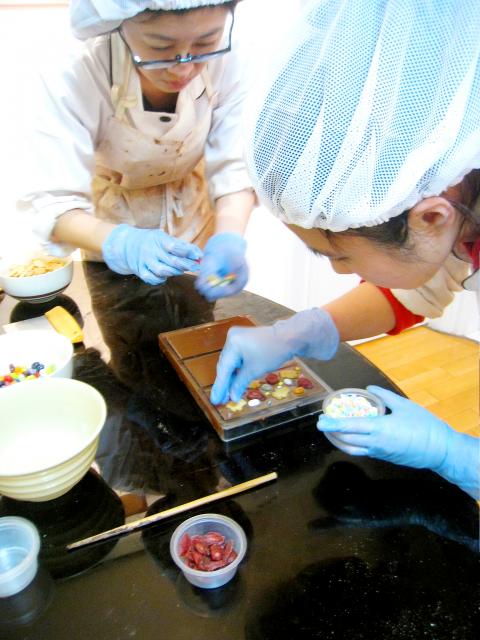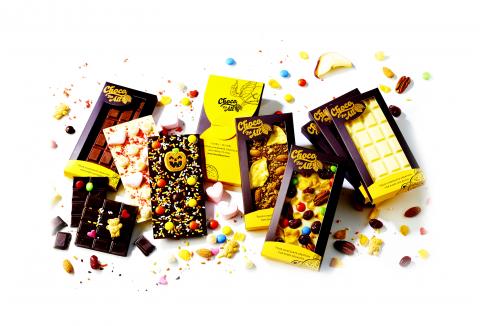You would have thought that Taiwanese would already be spoilt for choice in shopping for chocolate. Many of the big international brands are prominently represented here, from run-of-the-mill Cadbury chocolate bars, through slightly more sophisticated brands such as Lindt, then onward and upward through premium brands such as Godiva and Royce, up to handcrafted super premium chocolates such as Jean-Paul Hevin. The price range and selection is huge, but one thing is pretty much constant: you choose from chocolates that have been designed and created by others.
ChocoForAll, a small Internet-based business that recently opened in Taipei, aims to give greater freedom of choice to shoppers, allowing them the opportunity to add their own ingredients and design elements to their chocolate bars from a choice of over 120 ingredients. Although ChocoForAll have only been in operation for just over six months, Douglas Ma (馬子超), co-founder of ChocoForAll, said that they have already been run off their feet over the Christmas, New Year and Valentine’s festive season, as people sought a new way of providing a novel gift that conveyed something more than just a whole load of calories.
Ma, a Taiwanese American back home after completing a business degree in the US, said that Taiwan is an ideal place for such a venture, not least because of a pervasive Internet culture and a well developed acceptance of shopping online.

Photo courtesy of ChocoForAll
“I think one of the great things about Taiwan (for us) is that it is a small country. Basically, if something catches on it is going to spread like wildfire. … All of Taiwan will know about it very soon. … In the US, you probably would need to spend a lot more time establishing yourself in the market,” Ma said. He emphasized the importance of blogs in spreading the word about ChocoForAll, saying that when people see something special on a blog, or a celebrity is seen using a product and the image is posted, people catch on to the new product very quickly.
Another factor that has allowed the young company to get such a good start has been the importance of food in Taiwanese life. “The great thing about Taiwan is that food is such an important part of the culture,” Ma said. “As long as it’s a great idea for food, the market will probably be able to accept it. … We didn’t want to do traditional retail, as there is just too much competition in the food and beverage sector, but we saw that there was no e-commerce operation focusing on chocolate. A lot of the big brands sell online, but that is not their focus,” Ma said.
The basis for the system at ChocoForAll is to visit the Web site’s “creation station” and select your choice of dark, milk or white chocolate, then choose up to five ingredients that can be added to the bar. This includes everything from conventional choices such as various kinds of nuts and dried fruit, to the exotic or even bizarre, such as curry powder, jellybeans, mochi and gold leaf.

Photo courtesy of ChocoForAll
The potential to make unique combinations is unlimited, and Ma said that they try their best to meet these requirements. “We’ve had some crazy requests that we have not been able to accommodate,” Ma said, but the company is constantly collecting information about what people want, “and if there is enough demand for an ingredient to be included in a chocolate, we will offer it.”
Ma added that while many of the ingredients and decorations are imported from the US, the company has also made a big effort to include Taiwanese products, particularly local dried fruits, and one of their most popular items is mochi, which introduces that chewy texture so much beloved of Taiwanese.
Valentine’s Day proved a spur for innovation. For this festival, ChocoForAll introduced a Valentine’s His and Her chocolate bar set, began selling chocolate lollipops, and also launched a short message service so that chocolate bars can include a customized name or short message.

Photo courtesy of ChocoForAll
Ma said that they had received lots of feedback from early customers asking if the company offered anything smaller than a standard-sized chocolate bar, which some felt was too big. The lollipops, sized at about two or three mouthfuls, but with all the mix of ingredients that a customer chooses, have already met with considerable success.
The writing service, which was originally launched as a special service for Valentine’s day, had such a great response that the company is now planning to offer it as a regular part of its services. Originally, the message could only be made up of a specific selection of words, but customer pressure has enlarged the scope to include simple Chinese and even words in Korean.
The option to be personal with chocolate is a great attraction, according to Ma. “Customization is something that most people will appreciate. It’s all about having choices.”

Photo courtesy of ChocoForAll
More information about ChocoForAll can be found in English and Chinese at www.chocoforall.com.

“Why does Taiwan identity decline?”a group of researchers lead by University of Nevada political scientist Austin Wang (王宏恩) asked in a recent paper. After all, it is not difficult to explain the rise in Taiwanese identity after the early 1990s. But no model predicted its decline during the 2016-2018 period, they say. After testing various alternative explanations, Wang et al argue that the fall-off in Taiwanese identity during that period is related to voter hedging based on the performance of the Democratic Progressive Party (DPP). Since the DPP is perceived as the guardian of Taiwan identity, when it performs well,

The Taiwan People’s Party (TPP) on May 18 held a rally in Taichung to mark the anniversary of President William Lai’s (賴清德) inauguration on May 20. The title of the rally could be loosely translated to “May 18 recall fraudulent goods” (518退貨ㄌㄨㄚˋ!). Unlike in English, where the terms are the same, “recall” (退貨) in this context refers to product recalls due to damaged, defective or fraudulent merchandise, not the political recalls (罷免) currently dominating the headlines. I attended the rally to determine if the impression was correct that the TPP under party Chairman Huang Kuo-Chang (黃國昌) had little of a

At Computex 2025, Nvidia CEO Jensen Huang (黃仁勳) urged the government to subsidize AI. “All schools in Taiwan must integrate AI into their curricula,” he declared. A few months earlier, he said, “If I were a student today, I’d immediately start using tools like ChatGPT, Gemini Pro and Grok to learn, write and accelerate my thinking.” Huang sees the AI-bullet train leaving the station. And as one of its drivers, he’s worried about youth not getting on board — bad for their careers, and bad for his workforce. As a semiconductor supply-chain powerhouse and AI hub wannabe, Taiwan is seeing

Jade Mountain (玉山) — Taiwan’s highest peak — is the ultimate goal for those attempting a through-hike of the Mountains to Sea National Greenway (山海圳國家綠道), and that’s precisely where we’re headed in this final installment of a quartet of articles covering the Greenway. Picking up the trail at the Tsou tribal villages of Dabang and Tefuye, it’s worth stocking up on provisions before setting off, since — aside from the scant offerings available on the mountain’s Dongpu Lodge (東埔山莊) and Paiyun Lodge’s (排雲山莊) meal service — there’s nowhere to get food from here on out. TEFUYE HISTORIC TRAIL The journey recommences with